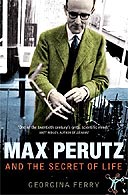
Max Perutz and the Secret of Life
by Georgina Ferry
Chatto & Windus £25, pp352
In 1980, Max Perutz was asked by the Repository for Germinal Choice to become a sperm donor. Father an unknown child and pass on your distinguished genes to a new generation, it suggested. Perutz was unamused and wrote an outraged letter to the sperm bank's organisers. 'I am small, bald, short-sighted and cross-eyed, my testes have been exposed to X-rays these 44 years and I am plagued by multiple allergies and crippled by back trouble.'
Not many desirable genetic traits there, it would seem. More to the point, Perutz could have mentioned but didn't, he was also a hypochondriac of paranoid proportions, viewing candlelit restaurants, unripe bananas, mineral water and most everyday phenomena as threats, not just to his health, but to his life. He also had long absences from work because of 'tummy troubles' whose source was never pinpointed.
For good measure, his behaviour was often wildly unconventional. He frequently lectured lying on his back, refused to travel without a large collection of comfort cushions and, having contracted shingles, claimed he could only alleviate its symptoms by listening to Beethoven's sonatas. Once, at the 1993 International Congress on Genetics in Birmingham, seated high on a podium as the meeting's guest of honour, Perutz decided he had had enough of the civic dignitaries droning on below. First, he read and shuffled his papers; then he took off his jacket and next his jumper; and finally, in the throes of tertiary boredom, he began eating his packed lunch. The Observer was so impressed that it ran a story congratulating the biologist 'for maintaining a standard of eccentricity that goes above and beyond the call of duty'.
Certainly, such behaviour makes good material for a biography, though it should be noted that Perutz, who died, aged 87, in 2002, was also one of Britain's greatest postwar scientists, winning the 1962 Nobel Prize for chemistry for unravelling the structure of haemoglobin, the blood-borne chemical that carries life-sustaining oxygen from our lungs to our tissues. The discovery's impact on medicine has been profound.
Even more impressive was his career as a scientific mandarin. Perutz founded the Cambridge unit that became the Laboratory of Molecular Biology (LMB), which went on to scoop more science Nobels than several entire countries, including France and Canada. Under his influence, Francis Crick, Jim Watson, John Kendrew, Fred Sanger, Sydney Brenner, John Sulston, Aaron Klug and Bob Horvitz carried out work that won them science's ultimate accolade. As Georgina Ferry states in her elegant, adroit biography: 'You couldn't throw a stick down an LMB corridor without hitting a Nobel Prize winner.'
As to the secret of his success as laboratory director, Perutz was unequivocal: use only the gentlest of touches on the tiller. 'Creativity in science, as in the arts, cannot be organised,' he said. 'It arises spontaneously from individual talent. Well-run laboratories can foster it, but hierarchical organisation, inflexible, bureaucratic rules and mountains of futile paperwork can kill it.'
Born of Jewish stock and raised in Austria in the 1920s, Perutz came to Britain just as the Nazis rose to power. He loved Britain but was - initially, at least - treated badly and was incarcerated in various camps for aliens at the start of the Second World War. However, his abilities as a climber and skier (pursuits that belied his self-proclaimed status as a weakling) and as a glacier researcher helped him gain his release and led to his involvement in Habbakuk, a bizarre project backed by Lord Mountbatten to build giant aircraft carriers made of ice to aid the bombing of Germany.
It was only in the postwar years that Perutz's genius was recognised and that he helped transform molecular biology into a breathtaking new discipline which reached its pinnacle with the completion of the Human Genome Project in 2003. And yet, for all his ground-breaking work, and regardless of his Nobel Prize, he was really just a plodder, according to Francis Crick, albeit it 'a very persistent plodder [who] had considerable insight as a result of his plodding'.
As to his personality, Perutz emerges from the pages of this delightful biography as a slightly vain, kind, insightful, self-obsessed family man who believed passionately in scientific progress and who also felt deeply about liberal causes. For example, though Jewish, he was an implacable opponent of Israel's treatment of its Arabs. Nor was he afraid to speak out. In his later years, he took up a number of causes - the viral roots of Aids, or the Iraq war - and wrote about them with passion and skill in periodicals that included the London Review of Books and the New Yorker. Best of all, however, Perutz was simply a perfect example of that precious creation: the eccentric but brilliant British boffin.

